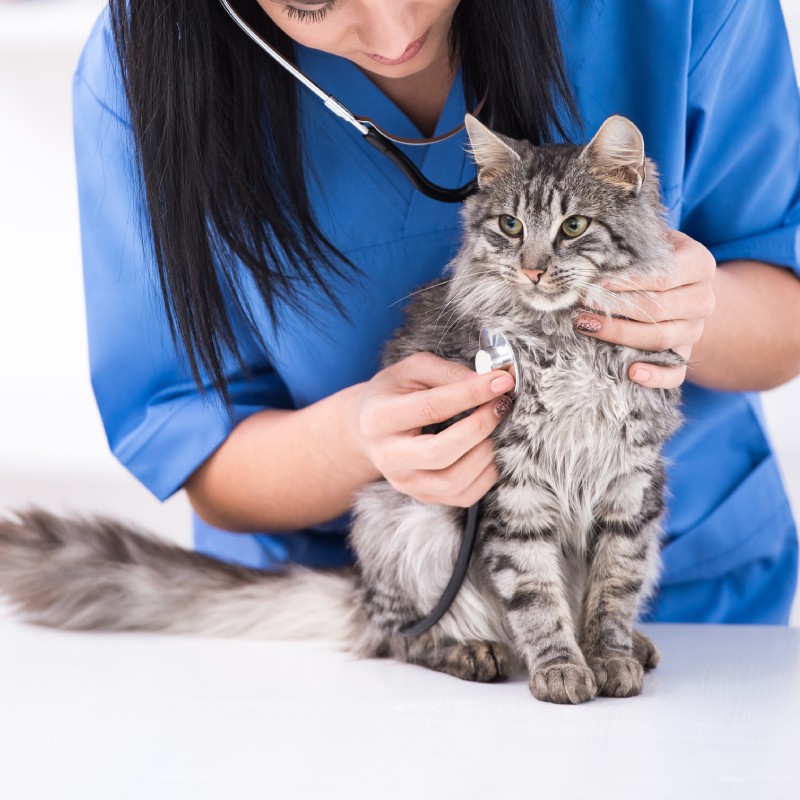Preventive Health Care Program
Just Cats has developed a Feline Preventive Health Care Program to provide you with guidelines to help maintain your cat’s health.

Cat Preventive Health Care Program
This program uses our years of experience and incorporates protocols and standards established by the following sources:
American Association of Feline Practitioners
American Veterinary Medical Association
American Association of Animal Hospitals
AAFP – Feline Vaccination Advisory Panel Report
It’s important to remember that cats are experts at hiding illness and medical concerns. The best way to keep your cat healthy is to adhere to a preventive health care program. As always, if you notice any unusual physical or behavioral changes with your cat, you should make an appointment to see us immediately.
We are committed to providing you with a lifetime of care for your cat. Feel free to discuss any part of this program with one of our veterinarians.
Kittens (birth to 20 months)
8 Weeks of Age
The first veterinary visit for most kittens should be around 8 weeks of age. At this initial visit, kittens should be tested for internal parasites (worms and Giardia). While testing can be helpful in determining the presence of parasite eggs, if the parasite is not actively shedding eggs, some parasites can elude detection.
Therefore, in addition to screening, we also recommend deworming kittens with a broad-spectrum dewormer that will kill roundworms and hookworms, which are both common parasites in kittens.
At this age, kittens are old enough to start immunizations. The first immunization given is referred to as “distemper” or FVRCP. Though the vaccine does protect cats against the distemper virus (Panleukopenia Virus), it also provides protection against Feline Viral Rhinotracheitis and Calicivirus. These are all highly contagious respiratory diseases that can be transmitted through human contact with sick animals.
Screening for feline leukemia virus (FeLV) and feline immunodeficiency virus (FIV) should also be considered at this first visit. These are viruses that can be passed from mother cats to kittens. They can also be transmitted to other cats through bite or scratch wounds. If you have another cat at home, it is a good idea to have your kitten screened with this blood test before introducing the cat.
12 Weeks of Age
A second booster against FVRCP is recommended at 12 weeks of age. When kittens are born first born, some of their mother’s blood is still circulating in their system. As they age, the blood degrades. There is no set amount of time for the blood to dissipate. Recent studies have shown that it may take as long as 6 months for kittens to completely eliminate their mom’s blood from their system. If the mom’s blood is present at the time of vaccination, it can interfere with the kitten’s development of an immune response to the vaccines. Therefore, three boosters against FVRCP are recommended to ensure kittens are given enough immunizations for their body to develop a proper immune response against the disease.
A second deworming is also recommended at 12 weeks of age. Two deworming treatments are recommended to ensure that all life stages (eggs to adulthood) of the parasite are addressed. For the second deworming, a different medication is used, which addresses not only roundworms and hookworms but also tapeworms, another common parasite in kittens.
This visit is also the time to give the first leukemia vaccine. Feline leukemia is a virus transmitted through bite or scratch wounds from other cats – or even through mutual grooming or shared food bowls. It is recommended that all kittens receive this vaccination as protection against this fatal virus.
16 Weeks of Age
At the third kitten visit, the third and final FVRCP booster is administered, along with the second and final leukemia vaccine. A rabies vaccine should also be given at this time.
After this visit, kittens are considered protected against distemper (FVRCP), the leukemia virus, and rabies for one year. After one year, these vaccines will need to be boostered.
20 Weeks of Age
Approximately 20-24 weeks of age is the recommended time to have your kitten spayed (if she is a female) or neutered (if he is a male). Spaying cats before they go into heat makes the surgery a less complicated procedure and greatly reduces the chances of reproductive tract disease and undesirable behavior later in life. Neutering cats before they mature also lessens the likelihood of spraying and aggressive behavior. Both of these are outpatient procedures – cats are dropped off in the morning and can go home that afternoon.
Adult Cats (Ages 1-9)
Yearly examinations are recommended for all cats. At one year of age, a cat is equivalent to 16 human years, and cats age 4 additional years every year thereafter. Therefore, many things can change in a year for a cat. Examination aids in disease prevention and early disease detection, which allows for more effective treatment.
Vaccinations may not be necessary yearly. One year after the initial distemper, rabies, and leukemia vaccines, cats should be evaluated again by the veterinarian. If healthy, the veterinarian will administer additional boosters of these vaccines that will be effective for 1 year. After the immunizations that are administered to kittens and the initial booster vaccines one year later, the next FVRCP immunizations will be effective for 3 years. The rabies boosters are continued annually (or once every 3 years if a 3-year vaccine is administered). For cats that go outside or have a risk of exposure to the leukemia virus, yearly immunization against the feline leukemia virus is recommended.
For cats that go outside, the risk of exposure to parasites is high. Cats can get parasites from hunting and ingesting prey, grooming an infected animal, or even chewing on grass or drinking water that has parasite eggs. Yearly worm testing to detect the presence of parasites or deworming with a broad-spectrum dewormer is recommended for these cats.
Mature Cats (Ages 10+)
Mature cats (10 years or older) follow the same vaccine schedule as adult cats.
Age 10 and older are most commonly when cats have an increased incidence of health issues. Therefore, additional attention should be given to this age group. Ideally, cats aged 10 and older should have examinations two times a year. An examination aids in disease prevention and early disease detection.
To help aid in early disease detection, yearly bloodwork and blood pressure, screening is also recommended for cats over age 10.
